#anti-criticism
Explore tagged Tumblr posts
Text
THE SPECTACULAR LEVIATHAN
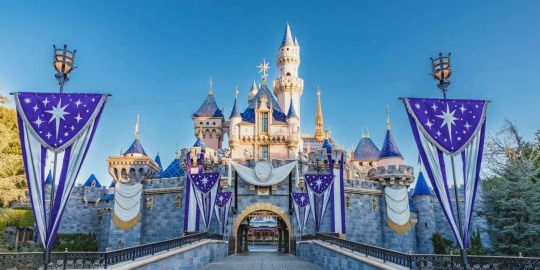
an essay about criticism and culture
ed sheeran doesn't need music critics
Rolling Stone published an article of cut content from a recent Ed Sheeran feature, in which the pop musician said, "Why do you need to read a review? Listen to it. It’s freely available! Make up your own mind. I would never read an album review and go, ‘I’m not gonna listen to that now.'"
And to some degree, Sheeran is right. Streaming services make music readily available and conjure the illusion that it's also freely given to us. We don't "need" cultural gatekeepers - such as, ironically, Rolling Stone - to tell us whether or not the newest song by Ed Sheeran is bad (that's just a deeply felt sense we hold in our bones, which Spotify or Apple Music can help us confirm at our leisure).
But like most criticism-of-criticism in this vein, Sheeran's point misses the forest for the trees. We absolutely don't need critics to tell us whether "thing good" or "thing bad," but that's not necessarily why critics even exist in the first place. In addition to that sort of mere qualitative statement, critics exist to help us understand context, like how financially deleterious the very existence of streaming services is to the artists themselves, for example, or how subscribing to a streaming service means that your music collection is never actually yours and can be revoked by the record companies at any time. Critics can help to place Sheeran in his historical context as a contemporary singer and songwriter, or offer more palatable, lesser-known alternatives to his vapid art. Critics could, if they wanted, try to situate Sheeran's songs in a political context, though I could not tell you how that would shake out to save my life.
Sheeran is not the only person to make that mistake, by any means. The idea that critics are unnecessary today except as objects of derision or agreement is popular, and the idea that criticism is only there to tell you whether "thing good" or "thing bad" is even upheld by people responsible for making sure criticism gets published to a broad audience, like IGN's executive editor of reviews.
Critics ourselves are often pushed into this narrow view of our field whether we like it or not, not necessarily out of malice but out of the harsh realities of business in the media industry. We watch as our friends and colleagues get fired from their "sure thing" jobs regularly, as outlets shutter and downsize to focus only on that which can get the greatest algorithmic return-on-investment.
Even with service journalism, the underpaid and undervalued field where writers put out dozens of how-to guides on everything from "How do I beat this level in Final Fantasy VII Remake" to "Where can I find the latest blockbuster on streaming," writers' jobs are being threatened by the looming mistake of Large Language Model (LLM)-generated content. Why pay someone to write an accurate, carefully considered guide that actually feels like a person wrote them - you know, the appeal of old chestnuts like GameFAQs guides - when you can just get a chatbot (and by extension, forced labor in Kenya) to do the work instead? At a certain level of bullshit jobs-style upper management, what's considered "efficient" is directly antithetical to human life.
But this isn't Ed Sheeran's fault, per se, nor is it really his problem. He's a point on a graph of a much broader trend.
anti-criticism in the age of disney adults
Poet laureate Karl Shapiro identified the concept of "anti-criticism" in a series of lectures delivered from October to December, 1949.1 He saw "[arguments] against criticism [as] related to a wider and more dangerous anti-intellectualism that in poetics leads to the primacy of the second-rate, and in literary politics may lead to official and controlled art." In his ensuing Poetry article, "What is Anti-Criticism?" Shapiro briefly examines the history of 18th and 19th century poetry and how it was analyzed, carefully demonstrating the values such structural and interpretive analysis upheld and how they were incompatible with contemporary 20th century poetry - and indeed, its critical apparatus.
The anti-critic takes for his quarry not only the modern symbolist poets but also the old symbolist poets like Blake; not only the modern metaphysical poets but also the old metaphysical poets; and in addition to these the polylingual poets; those who practice typographical or grammatical experiments, past or present; those who use one rhetorical figure at the expense of the other- those who are too abstract and those who are too concrete. The contemporary poet may not be tolerant of all these kinds of poetry himself, but the anti-critic would like to get rid of the lot. His measure, as I said before, is the prose semantic, and any violation of this central canon he regards as a threat to intelligibility and sanity. To the anti-critic any departure from the immediate area of the paraphrasable meaning is, moreover, a sign of wilful obscurantism. [...] A highly paraphrasable poetry is equivalent to a highly representational art, and both, in a period like ours, are liable to degenerate into escapist art.
Shapiro describes phenomena that would likely be familiar to anyone who has lived through the last decade of critical discourse around any kind of art you can imagine, from the indiscriminate uplifting of mediocre yet broadly popular "cultural products" to the bashing of art that resists easy interpretation and a sneering attitude toward the critics who attempt to analyze said art anyway. Through Shapiro we see anti-critics in those who endlessly repeat "Let People Enjoy Things" at anyone who doesn't like a superhero movie, in the throngs of gamers (and the reviewers who enabled them) who refused to let a little systemic transphobia get in the way of their Hogwarts Legacy run, and in Ed Sheeran's throwaway jab at the critics forced to listen to his pablum for less money than they should be getting for their troubles.
The anti-critic has surely evolved in other important ways away from what Shapiro observed in the first few years after World War II, just as the corporate media/art space has evolved. We see the "enthusiast" subsume more formal critics and critical outlets all the time, coincidentally as a monoculture forms around a few massive entertainment and technology corporations. In one particularly blunt example, critic B.D. McClay notes that a writer for IGN was replaced as the reviewer for the Disney+/Marvel series Loki after a single less-than-glowing review of the show. In a more recent example, replies to longtime film critic Robert Daniels's tweet panning The Super Mario Bros. Movie ranged from indifferent to derisive, with one reply telling him, "I’ll trust the reviews from people who actual [sic] play the game," together with a screenshot of IGN's 8/10 review synopsis.
We might revisit that IGN article that contends the purpose of criticism is to determine whether "thing good" or "thing bad," as it actually contends something worse: that the wide majority of things even worth talking about in IGN's eyes are broadly "good" along a sliding scale of quality from "mediocre" to "superlative." In this case, the criticism isn't even merely qualitative; it's meant to be singularly supportive or at worst ambivalent about a given cultural product. It is itself anti-criticism.
McClay (more charitably than I suspect Shapiro would have been) identifies the tendency for largely positive anti-critical writing about mass media as "a world of appreciation," not necessarily unadulterated fandom, but "essentially, a fan culture." In this dynamic, there is only people who like the thing, and the thing itself. If negativity in this world of appreciation exists, McClay explains, it does so as part of a binary: "the rave and the takedown."
an endless content™ jubilee
I remember when I first got into games criticism I heard everyone joke about the "discourse wheel" and how if you spent enough time in the industry you'd eventually find yourself back at the beginning, older, not necessarily wiser, yet experiencing many of the same arguments about a particular game or design concept yet again. The obvious punchline was someone yelling "LUDONARRATIVE DISSONANCE" and watching everyone in the discord server duck under their desks like an air raid alarm had gone off.
Since then, The Last of Us has gotten a sequel, a PC remaster, a full remake of the first game, and a whole-ass television show with a second season on the way. The discourse around that media franchise has happened in front of me not once, not twice, but like four times at this point. As Autumn Wright wrote, "there’s a new AAA catastrophe that’s weird about trans people and also The Last of Us is relevant again."
This is perhaps not the worst or wildest example of monoculture forming around us in a suffocating cloud, though. That dubious distinction goes to Disney and Microsoft, probably, as the companies attempting to gather up as much culture as they can to homogenize it, with the former going as far as digitizing actors' voices for use long after they retire in new portrayals of characters those actors first performed more than 40 years ago. Hell, it's not even the worst example in the games industry. What iteration number is Call of Duty on? Or Assassin's Creed? Or fucking Mario? Hell, we're already two deep into the reboot of God of War.
It's hardly worth saying at this point that nostalgia fuels so much of the media that we're given to consume. It's increasingly difficult to find new art or ideas in a media landscape that puts so much value on callbacks to old forms. If something isn't another superhero origin story, it's referencing a meme from 12 years ago. And it's nearly impossible to resist the ever-present pull of this strictly iterative culture: I can't lie and say I didn't thoroughly enjoy both of the above examples.
But we still need to try and cut through the overwhelm for a moment. Disney isn't a poison to the culture simply because it owns Marvel Studios or Lucasfilm. The reason for its negative impact is because of the absolute crushing presence it has in the film and television industries at large, having bought out major competitors like 20th Century Fox and nearly completely snowed out smaller film studios at the theaters. It doesn't help that the industry is consolidating in other ways with its move to streaming platforms. As Adam Conover said in a recent video about two different mergers (Live Nation and Ticket Master in the 90s and Warner Media with Discovery late last year), "one man's whims and preferences dictate which stories artists get to tell and what hundreds of millions of people get to watch."
The idea that a few rich dudes are in full control of every piece of media we consume and that the number of rich dudes who do so is actively getting smaller all the timesucks, not just for criticism's purposes but simply as someone who Consumes Content™. To my knowledge, no one has ever been explicitly asked if we want the same shit, year in and year out, only More. Nobody from Game Freak or Ubisoft ever sends out a survey like "hey are y'all tired of Pokémon or Rainbow Six: Siege seasons?" Instead, they just push them out, and let the resulting economic data do the talking: "People want more of this thing because a lot of them bought the thing when it came out." There's such a thing as too much of a good thing, especially when we're less likely (or able) to say no in the first place.
In this light, doesn't it make just too much sense that Ed Sheeran has a whole mini documentary series coming out on Disney Plus?
towards a guerrilla criticism
So what's to be done here? Aside from maybe the 🏴 most 🔥🍾 obvious 💣 (and unlikely) answers with regards to the most egregious monopolies, how can critics - who are, as a reminder, less institutionally supported than ever - or criticism even contend with Content™ backed by the most well-funded mega corps on earth and supported by hegemonically anti-critical fanbases?
Here is where I disagree most heavily with thinkers like Shapiro, who believed in retaining an elevated critical class and poetic movement with remove from the masses, and critics like McClay, who said "Opinions will become both more binary and more homogenous, and about fewer and fewer things. [...] things will get worse, whether or not they ever get better." I don't think our options necessarily have to be "remove ourselves to an academic ivory tower" or "accept that things are the way they are." We don't need to dutifully fall into line along the "rave" or "takedown" axis as McClay described.
The kind of criticism I am imagining is a criticism that is inherently and radically skeptical of (especially corporate-backed) nostalgia; a criticism that is not necessarily hostile to fans but antagonistic toward fandom as a system which undergirds larger structures of power; a criticism that is as transgressive and playful in the forms it takes as it is with the words that fill those forms. I believe we are capable of performing criticism that disappoints everyone in delightful ways.
Criticism as a weapon is not a new idea, of course. Marx is famously quoted as saying "The weapon of criticism cannot, of course, replace criticism of the weapon, material force must be overthrown by material force; but theory also becomes a material force as soon as it has gripped the masses." More modern philosophers and theorists, like the Situationists and Bruno Latour, have written about the decline and possible weaponization of criticism as well. To a degree, that worries me. Talk doesn't just become action because the talker wishes for it real hard. There's a real possibility, no, a near-certainty, that anything that comes out of this will result in next to nothing changing. If everything is part of the cycle of discourse, including conversations on how to break the discourse, what hope do we have?
The alternative to facing the leviathan and losing at the moment seems to be more or less doing nothing, which to me is more unbearable than all the pranks of all the cringe-ass culture jammers of the 90s and 2000s combined. At what point does quiet dissent simply morph into complicity?
***
Shapiro, Karl. “What Is Anti-Criticism?” Poetry, vol. 75, no. 6, 1950, pp. 339–51. JSTOR, http://www.jstor.org/stable/20591169. Accessed 9 Apr. 2023.
18 notes
·
View notes
Text
I'M FUCKING CRYING LMAOOO
#as someone who doesn't actually hate her music/a decent amount of her music i gotta say it's accurate#the thousand words crammed into one line and difficult flow/pacing#was about to tag this taylor swift and realized i wanna live#anti taylor swift#i guess???????#taylor swift critical#i suppose??????
46K notes
·
View notes
Text
- Zaunites dying to help Piltover in battle while wearing enforcer uniforms, even though Piltover did nothing to earn it
- Silco, one of the few pro-Zaun/anti-Piltover characters from season 1, reduced into a mouthpiece for "forgiving those who wronged you" and letting go
- Jinx, one of the few anti-Piltover characters, becoming redeemed by sympathizing with Piltovians, being apologetic for killing Councilors, and feeling like she should die to allow her sister to be happy with her enforcer girlfriend
- Vi not having any problem with her Piltovian enforcer girlfriend gassing Zaun, and reduced to kneeling for Caitlyn's pussy in a prison cell, where she was locked for years as a child by an enforcer
- Jayce telling Viktor that his disease was never a weakness to be cured even though the disease was caused by Piltover polluting Zaun
- Ekko never calling out Heimerdinger's failings as a ruler nor Vi for joining the enforcers (even though he does in the game), and also risking all the Firelights' lives to help Piltover
- Sevika not having any lines in Act 3, never interacting with Jinx or reacting to Isha's death, and also risking her life to help Piltover, a decision which was made off screen

#notice how EVERY ZAUNITE CHARACTER becomes a Piltover ally/sympathizer by the end#even the few characters who were explicitly anti Piltover (silco jinx sevika) get turned around by the end#arcane season 2#arcane league of legends#arcane s2#arcane#league of legends#arcane netflix#arcane critical#piltover#zaun#vi#jinx#silco#ekko#sevika#jayce#jayce talis#viktor#caitlyn kiramman#caitlyn
6K notes
·
View notes
Text
As a leftist Jew who believes strongly in the cause of dignity and freedom for the Palestinian people, and that Israel has abused them, I am begging fellow leftists to understand that real life is not a comic book. A government being “the bad guy” in a situation does not automatically make anyone who opposes it “the good guy”.
Hamas denies the Holocaust. Hamas disseminates the Protocols of the Elders of Zion—the conspiracy theory it paints is what they mean by “Zionist”. Hamas forbids foreign aid educators from teaching human rights to Palestinians, and claims that even teaching that the Holocaust happened is a war crime. Hamas has written the aim of annihilating Israel (the country and its people) into its charter—the mass slaughter and violent expulsion of 7 million Jews from the land is written into its laws.
There is no crime any state could ever do that would justify any of that; there is no act of state repression that could ever make it acceptable to side with the organization spreading Nazi pamphlets and Holocaust denial.
Oppose Bibi Netanyahu. Oppose Israel’s far-right, authoritarian government. Oppose Likud’s policies. Oppose its violence against Palestinian civilians. That isn’t antisemitic. But Hamas is—verifiably, beyond a shadow of a doubt, to its core—antisemitic. Its portrayal of Israeli Jews as blood-thirsty, child-killing master manipulators that control international media and finance is antisemitic. Its insistence that Palestinian freedom necessitates the death & expulsion of Jews from the land is antisemitic. Its redefinition of “Zionism” as a pejorative to mean genocidal Jewish/Israeli Supremacy is antisemitic.
Supporting the Palestinian people in their plight is a noble and loving goal; please never stop that. But do not let Hamas co-opt that into excusing or denying their rampant antisemitism and war crimes.
#I am terrified every time the Israel-Palestine conflict makes the news here#bc I inevitably see American leftists regurgitate Hamas propaganda with zero critical thought#and that unfortunately includes Jewish Anti-Zionists#Israel#Palestine#israel palestine conflict#jumblr#antisemitism#edit: I removed reference to Israel’s policies as ‘apartheid’ which I’ve increasingly come to see as an inaccurate & unhelpful comparison
23K notes
·
View notes
Text









»»------------------------------««
Throwing tomatoes at Jimmy stimboard
Req by myself
Note ; I hate him and want to throw things at him and expect a stimboard for my beloved Anya <33
🍅-👊-🍅
👊-🍅-👊
🍅-👊-🍅
»»------------------------------««

#autism#stim blog#actually autistic#stim#stimblr#stimming#stim gifs#stimboard#visual stim#punching stim#fighting stim#mouthwashing#jimmy mouthwashing#i hate jimmy#i want to throw him at a wall#tomato stim#fruit stim#tomatoe stimboard#mouthwashing jimmy#boo tomato tomato#cursed stim#joke stimboard#this is so unserious#unserious stimboard#mouthwashing shitpost#mouthwashing stimboard#angry stim#wrong organ#Critical Reflex#anti stim
4K notes
·
View notes
Text
“He was fond of me”

“And I of him”

If the writers of House of The Dragon keep gaslighting the audience into thinking Viserys was anything better than a powerful man who stole a young girls future, dreams and physical body in the quest for a son he will never love, I will riot
#i fucking hate it here#hotd spoilers#hotd critical#alicent Hightower#house of the dragon#house of the dragon spoilers#anti viserys i targaryen
6K notes
·
View notes
Text
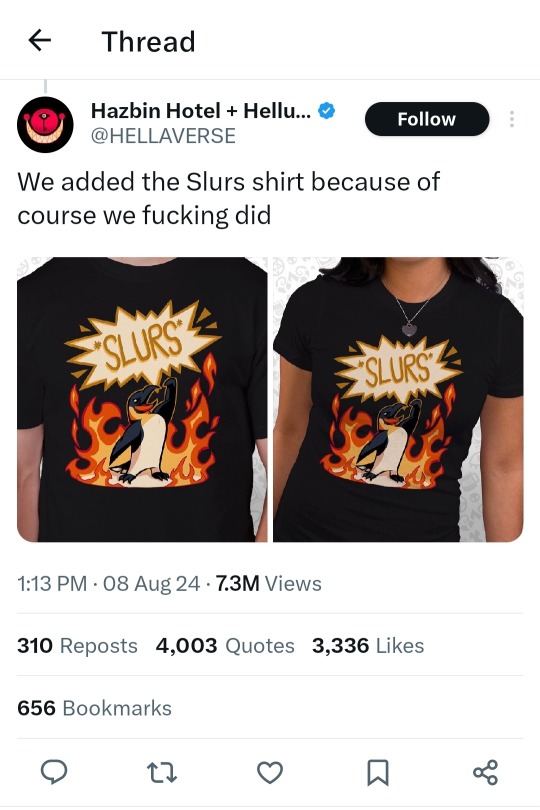





Lmaoooo

Edit:



Samantha is a Story Artist, Animator, and Animation BFA who works for Viv on both HH and HB.
2nd Edit: Some of y'all need to chill in the comments with certain things you say. It ain't finna make any point come across decently with how you spread some info. I get being mad at some of the reactions, don't get me wrong, but bring it back down slow plz.
#vivziepop critical#vivziepop criticism#helluva boss criticism#helluva boss fandom#helluva boss drama#spindle#spindlehorse critique#spindlehorse criticism#anti spindlehorse#spindlehorse critical#spindlehorse toons#vivienne medrano#viv get a grip
3K notes
·
View notes
Text
the writers were very deliberate with the horrific oppression of zaun and caitlyn’s spiral into fascist dictatorship, and yet, nothing got resolved. only one individual was made a representative of zaun, while piltover has several. zaun won’t be heard, because it wasn’t given the chance to, even when one of their own was put on the council. caitlyn didn’t redeem herself, because nothing that she sacrificed or did could undo the fact that she gassed the people who her society oppressed. she quite literally weaponized the gas that was created as a result of the labor of the oppressed, which we know permanently disables and decreases the lifespan of those who are exposed to it longterm (the only ones affected by this are zaunites). her story feels wrong because she suffers no actual repercussions for her horrendous actions. the story falls flat and the writing seems disingenuous because decisions like this were made. they cared more about a ship than they did about either caitlyn or vi and both characters suffered for it. caitlyn faces no consequences for her actions and vi is made a narrative device who has no opinion and immediately sacrifices her morals and forgives caitlyn. this results in them having sex in a jail cell very similar to the one vi lived in for years because of people like caitlyn. it is very… weird.
#arcane#arcane s2#arcane critical#anti caitvi#anti caitlyn kiramman#vi#astra.txt#sevika#i don’t think even the extended version of the finale would save this show#i’m being so fr
2K notes
·
View notes
Text
Aegon and Sunfyre canonically having the strongest dragonrider bond
Aegon and Sunfyre being so connected we get the quote “who can truly know the heart of a dragon?”
Sunfyre being the most beautiful dragon in the known world
Aegon choosing his sigil to honor SUNFYRE
I’m so sorry they did this to you my babies y’all deserved so much better.
3K notes
·
View notes
Text
Why Dragon Age Veilguard isn't a "Cathedral"
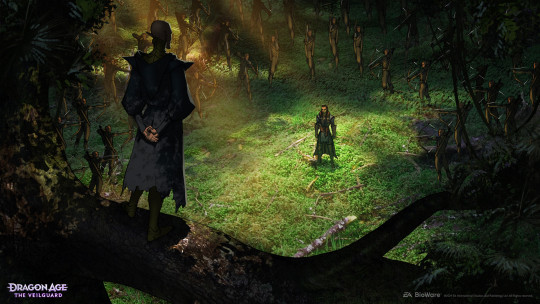
Concept art by Matt Rhodes
"To disinherit the storylines of past games goes directly against the notion of building cathedrals."
What is inherent with Veilguard that keeps bothering me is the fact that the world's choices truly didn't matter--and it doesn't simply bother me from a player perspective, it's not simply a grievance borne of frustration to what I (as a longtime fan) have lost. It's about the very culture of the arts under capitalism's new media habituation cycle [x][x].
Yes, I spent hours of my life playing and replaying each instalment of Dragon Age. Yes, I painstakingly curated a 'canon' world state by replaying what came before in preparation for Veilguard. Yes, I am even more unsatisfied with the end product--time hasn't helped, it's just widened the divide. But, and I can't stress this enough, these very personal gripes aren't what hit home the most. It's the inherent disregard of legacy. A legacy that the previous writers and game developers were building towards.
In the DAV artbook, "cathedral" is the word used to describe the process of making a game. Matt Rhodes' exact words are: "One artist can make a painting, but it takes a team to build a cathedral." Cathedrals took centuries to build. The architect who drafted the first blueprints would likely never see his work realised, he had to rely on those who came after him, like-minded and passionate, to see it through--for the culture, for the future, for legacy. Painters took on several apprentices for this reason too--giant frescoes were not completed by one man's hand, even if it is one man's name that immortalises them. Similarly, if you weave a narrative around choice, what good does it do to take it away at the final act if not to fall to caricature?
To disinherit the storylines of past games goes directly against the notion of building cathedrals.
Late-stage capitalism and profit-margin-obsessed game producers forcing developers to churn out meager content, to make a known brand into something it's not, to chase a fad or a popular trend... o, how reductive and cliche you've been forced to become Bioware. We have lost the cultural thought patterns relative to Cathedrals. We know only of barn-raised churches--done in a day but unlikely to last the turn of the seasons.
And don't even get me started on the music of Veilguard either. From Origins to World of Warcraft to Everquest to Baldur's Gate to Dungeon Siege, you can hear the intricate interconnected weave of sounds inspired by the Dungeons and Dragons-esque fantasy genre. You hear it in the repeated use of certain instruments, in the harmonic weeping notes of a bard-like singer or the foreboding echoes of drums as if of war. In tavern songs. But then, rather than hire someone who loves these worlds and this genre, who is a hungry artist looking to make a name, a legacy if you will, for themselves with a spectacular score, you hire any already sated composer, one well-into the encroaching years of career fatigue, whose notes repeat in countless projects, who feels less concise and more uninterested with each new project. One who has long since cemented his legacy. Someone in it for a paycheck and nothing else! And, to top it off, you let him compose something so minimalist? I am offended actually.
Cathedrals! We should have witnessed the final tile being placed on the Dragon Age cathedral. Instead, some architects walked up, tore down the interior and installed IKEA furniture and called it authentic before having to call the previous architects to come and fix the "load-bearing issues", forcing them to rush and add a coat of varnish and a few 'aged' details for authenticity.
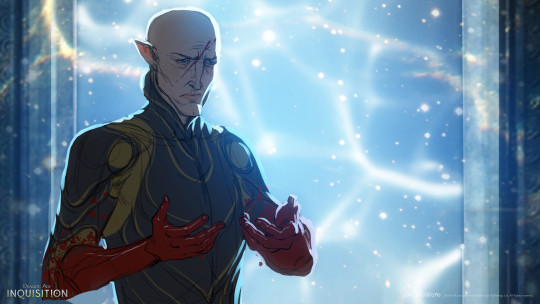
#dragon age veilguard#veilguard#dragon age#bioware#veilguard critical#da:tv#dragon age the veilguard#matt rhodes#veilguard concept art#dragon age artbook#a cathedral in ruin#i am being dramatic and in my feels but also it's not about me--it's about the literal disney-ification/corporatisation of media now#this post is also anti hans zimmer hype#like... that man has been phoning it in for a while now#pack it up#let new talent come in#stop gatekeeping the arts by flooding the mainstream with the same composers/actors/writers#media studies#as a solasmancer i got my happy ending#as a dragon age player?#yeah... no.#i couldn't sleep until this was exorcised from my brain
3K notes
·
View notes
Text
The Sanitized Lore of Dragon Age: The Veilguard
Tevinter is the heart of slavery in Thedas. This lore has been established in every game, novel, comic, and other extended material in the Dragon Age franchise to date that so much as mentions the nation. But in Dragon Age: The Veilguard, when we are finally able to actually visit this location for the first time… this rampant slavery we’ve heard so much about is nowhere to be found. It’s talked about here and there; Neve mentions The Viper has a history of freeing slaves, as does Rook themselves if they choose the Shadow Dragon faction as their origin, for example. But walking down the streets of Minrathous, you’d never know. Because Dragon Age: The Veilguard, for all its enjoyment otherwise, has one glaring issue: It’s too clean.
The world of Thedas is full of injustices. Humans persecute elves, fear qunari, and belittle dwarves. Mages of any race are treated like caged animals in most places. The nobility is corrupt. Although, Dragon Age has not always handled these injustices well, mind you. Many, many times I’ve found myself frustrated with moments that just feel like a Racism Simulator. But what makes it worth it, is when you can actually do something about it. These injustices are things that a good-aligned character strives to fight back against, maybe even for very personal reasons. Part of the power-fantasy for many minorities is that this fight feels tangible. I cannot arrange the assassination of a corrupt politician in real life, but I sure can get Celene Valmont stabbed to death in Dragon Age: Inquisition, for example. Additionally, these fictional injustices can be used to make statements on real life parallels, like any source of media. For example, no, the Chant of Light is not real, but acting as a stand-in for Catholicism, through a media analysis lens we can explore what the Chant of Light communicates on a figurative level.
When starting Dragon Age: The Veilguard and selecting to play as an elf – this should be unsurprising to anyone who is familiar with my bias towards them – I was fully prepared to enter the streets of Minrathous and immediately get called “knife-ear” or “rabbit”. But this did not happen. I thought perhaps it was just a prologue thing, but returning to Minrathous once again, there was not a single shred of disapproval from any NPC I encountered that wasn’t a generic enemy to fight. And even the generic enemies, the Tevinter Nationalist cult of the Venatori, didn’t seem to care at all that I was a lineage they deemed inferior before now. This is a stark difference from entering the Winter Palace in Dragon Age: Inquisition and immediately getting hit with court disapproval and insults. Are we now to believe that Tevinter has somehow solved its astronomical racism and classism problems in the ten years since the past game? Or perhaps are we to believe all the characters who have demonstrated Tevinter’s systemic discriminatory views were just lying or outliers? Because it makes absolutely no sense at all for this horribly corrupt nation to not have a shred of reactivity to an elven or qunari Rook prancing around. But here were are, and not a single NPC even recognizes my character’s lineage. And because this is so different from every single past game, it feels weird.
As an elf, you have the option to make a comment about how “too many humans look down on us” in one scene early in the game. You can also talk to Bellara and Davrin, the elven companions, about concerns that people won’t trust elves after finding out about the big bad Ancient Evanuris… but this is presented as if elves don’t already face persecution. It’s all so limited in scope that it could be all too easily missed if you are not paying very close attention, and coming into the game with pre-existing lore knowledge.
All this made it easy to first assume that the developers simply over-corrected an attempt to address the Racism Simulator moments. And if that was the case, than I would at least give credit to effort; they did not find the right balance, but they at least tried. However, the sudden lack of discrimination against different lineages in Dragon Age: The Veilguard is not the only sanitized example of lore present.
In Dragon Age: Origins, Zevran Arainai is a companion who is from the Antivan Crows; a group of assassins. He discusses in detail how the Crows buy children and raise them into murder machines through all kinds of torture. The World of Thedas books also describe how the Antivan Crows work, echoing what Zevran says and expanding that of the recruitment, only a select handful of those taken by the Crows even survive. When you start Dragon Age: The Veilguard as an Antivan Crow, you immediately unlock a re-used codex entry from the past, “The Crows and Queen Madrigal”, that says the following:
“His guild has a reputation to uphold. They are ruthless, efficient, and discreet. How would they maintain such notoriety if agents routinely revealed the names of employers with something as "banal" as torture.”
Ruthless, efficient, and discreet. Torture is banal. This is what the Crows were before Dragon Age: The Veilguard decided to take them in a very different direction. The Antivan Crows in this latest game are painted as freedom fighters against the Antaam occupation of Treviso. Teia calls the Crows “patriots”. And while I can certainly believe that the Crows would have enough motivation to fight back against the Antaam, given that it is in direct opposition to their own goals, I cannot understand why they are suddenly suggested to be morally good. They are assassins. They treat their people like tools and murder for money. Even as recent as the Tevinter Nights story Eight Little Talons, it is addressed that the Antivan Crows are in it for the coin and power, with characters like Teia being outliers for wanting to change that. It makes the use of the older codex all the more confusing, as it sets the Antivan Crows up as something they are no longer portrayed as.
I personally think it would have been really interesting to explore a morally corrupt faction in comparison to say, the Shadow Dragons. Perhaps even as a protagonist, address things like the enslavement of “recruits” to make the faction at least somewhat better. (They are still assassins, after all.) Instead, we’re just supposed to ignore everything unsavory about them, I suppose…
We could discuss even further examples. Like how the Lords of Fortune pillage ruins but it’s okay, because they never sell artifacts of cultural importance, supposedly. Or how the only problem with the Templar Order in Tevinter is just the “bad apples” that work with Venatori. I could go on, but I don’t think I have to.
It is because of all this sanitization, that I cannot believe this was simply over-correction on a developmental part. Especially when there is still racism in the game, in other forms. The impression I’m left with feels far deeper than that; it feels corporate. As if a computer ran through the game’s script and got rid of anything with “too much” political substance. The strongest statements are hidden in codex entries, and I almost suspect they had to be snuck in.
Between a Racism Simulator and just ignoring anything bad whatsoever, I believe a balance is achievable; that sweet spot that actually has something to say about what it is presenting. I know it is achievable, because there are a few bright spots of this that I’ve encountered in Dragon Age: The Veilguard too. For example, some of the codex entries like I mentioned, and almost all the content with the Grey Wardens thus far. It is a shame there is not more content on this level.
Dragon Age: The Veilguard is overall still a fun game, in my opinion. But it’s hard to argue that it isn’t missing the grit of its predecessors. The sharp edges have been smoothed. The claws have been removed. The house has been baby-proofed. And for what purpose?
-----
Want to support me writing more essays like this? Become a Patron!
#dragon age#datv#datv critical#datv spoilers#not really but tagging just in case#meta#anti bioware#we're so back
2K notes
·
View notes
Text
Ive noticed that men frequently imagine they can slop perfectly.
#anti sex industry#pro misandry#gender critical#gender abolition#genderideology#radical feminists do touch
2K notes
·
View notes
Text
Men's antagonism toward women's self defense strategies reflects their discomfort with female empowerment. When women take measures to protect themselves, such as carrying weapons or walking with dogs, some men attempt to undermine their efforts, which reveals a desire to maintain control over women by keeping them vulnerable. Radical feminist critiques of sex work focus on the broader systemic forces that push women into the industry, rather than simply protecting workers. They argue that by targeting the demand for sex work and providing resources to exit, feminists can dismantle the structures that exploit women. Radical feminists often criticize the liberal feminist approach to sex work for not addressing the root causes of exploitation. While criminalizing sex work without further support systems can harm workers, radical feminists argue for a broader restructuring of society to provide alternatives. By focusing on creating safe exits from the sex industry, they emphasize the importance of long-term solutions that protect women from exploitation while challenging the economic systems that perpetuate it. Many radical feminists express exhaustion with online activism, feeling that it lacks the power to effect real change. While digital spaces have provided a platform for feminist ideas, they can also become echo chambers where meaningful action is sidelined. The call to move from online discourse to real-world organizing reflects a desire for more tangible, collective action that can challenge oppressive systems and create lasting social change. The transactional nature of transgender healthcare raises ethical concerns. The ease with which some can access hormones or surgery, without deep psychological evaluation, reflects a healthcare system that often prioritizes efficiency over thoroughness. While access to healthcare is vital, the lack of comprehensive mental health screenings can leave individuals unprepared for the emotional and psychological challenges of transitioning, ultimately failing to offer truly holistic care. Lets tring through a scary room and see if we find any drippulous vaginas along the way.Nothing good ever comes from slop with drabbley Shadow. Why would you trip over a chicken like that in the middle of rat's squibulous burgers?

#Gay erasure#tra stupidity#gendercritical#anti male#radblr#gender criticism#anti pornography#gender cult#female chauvinist
2K notes
·
View notes
Text
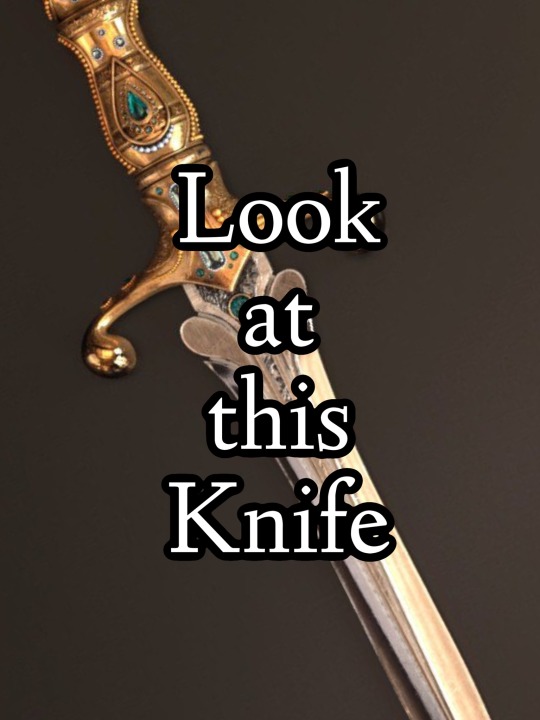


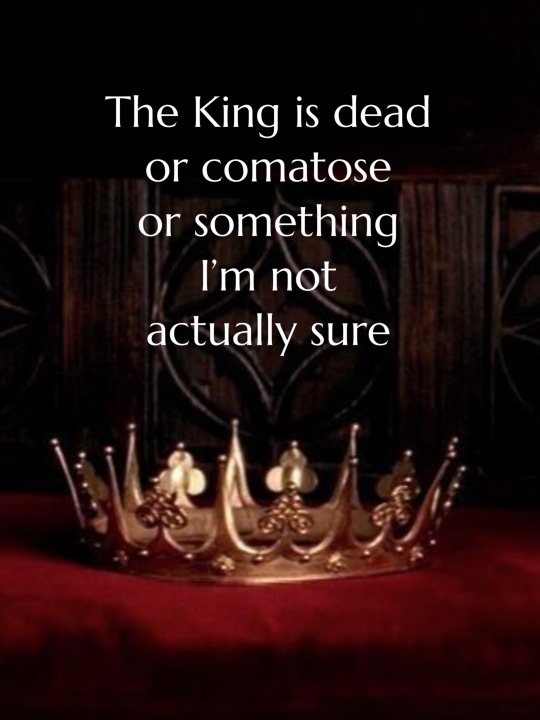
YA novel covers
#ya novels#bookblr#book tumblr#booktube#booktok#booktok critical#books and reading#writeblur#writeblr#writblur#memes#booktok cringe#they all look the same#anti game of thrones#game of thrones critical#serpent and dove critical#serpent and dove#meme#my memes#book memes#books#bookish#book covers#book cover
10K notes
·
View notes
Text




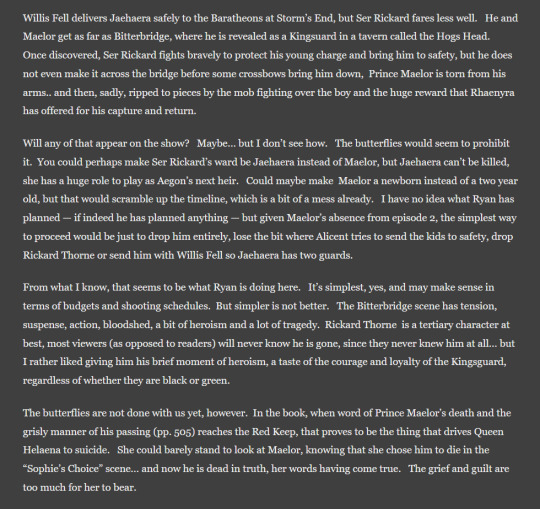

GRRM's newest blog post
#grrm reads my blog confirmed 😁#or my reddit lmao#helaena targaryen#helaena#hotd critical#anti hotd#hotd#asoiaf#maelor targaryen
2K notes
·
View notes
Text
No fucking way are Caitvi shippers happy with this writing right? No way are lesbians happy with this representation? A straight couple that never even took off in the main timeline got a whole episode set in an alternate universe just to explore their relationship and it was cute, tender, romantic, and had the best song in the entire series. The lesbian couple gets a rushed sex scene in a dirty dungeon with some generic spicy pop song while both women's characterization are dogshit (so Cait doesn't care that Jinx escaped? Vi isn't worried about Jinx or wants to go after her?) Vi's character is completely disrespected. She is just made to accept Caitlyn fucking Maddie while Vi was suffering through an alcoholic mental breakdown and Caitlyn never looked for her or thought of her. She is made to completely forgive everything Caitlyn did while in power. She is made to brush aside her own sister, friends, family, and home to only focus on Caitlyn. All her brains scooped out and replaced only with Caitlyn. And there are Caitvi fans who are actually happy with this shit? Am I going insane??

#arcane critical#anti caitvi#caitvi critical#arcane season 2#arcane s2#arcane netflix#arcane league of legends#vi#caitlyn#league of legends#people are actually celebrating this?#i'd feel insulted
1K notes
·
View notes